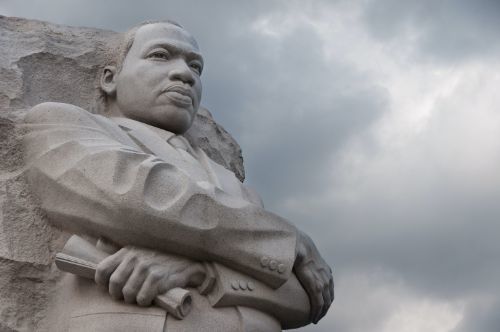
Dr. Martin Luther King, Jr, a Champion for Education, lived a short time on earth; yet his legacy continues to be alive and thriving. Most Americans, especially African Americans, remember best his I Have a Dream speech. Although profoundly prophetic, other of Dr. King’s speeches are also impactful. Dr. King advocated for truth in education and a was proponent of equality and efficiency in education. Operation Xcel, as an advocate and proponent of equal access to quality education, inspires students to think critically and develop character and career mindfulness through its after-school, summer, and mentorship programs.
The following is a list of (not so famous) quotes from Dr. King concerning education in America. These quotes are taken from a paper that Dr. Martin Luther King, Jr. wrote while a student at Morehouse College in 1947—The Purpose of Education.
“The complete education gives one not only power of concentration, but worthy objectives upon which to concentrate.”
“Education must enable a man to become more efficient, to achieve with increasing facility the legitimate goals of his life.”
“Education must also train one for quick, resolute and effective thinking.”
“Education must enable one to sift and weigh evidence, to discern the true from the false, the real from the unreal, and the facts from the fiction.”
“The function of education, therefore, is to teach one to think intensively and to think critically. But education which stops with efficiency may prove the greatest menace to society.”
“We must remember that intelligence is not enough. Intelligence plus character — that is the goal of true education.”
Dr. King believed that education must inspire students to think critically, looking beyond words spoken from lecterns or the pages of books toward the rationale and reasoning behind the themes that the words create. The purpose of critical thinking is not only to examine what makes reasons and statements good but also to enhance the student's reasoning skills. This means improving students’ ability to form, maintain, and reject beliefs based on whether they meet the criteria of good thinking would help students develop toward successful futures.
Students should not blindly accept what is taught or read; instead, they must learn to think critically and independently. While formal reasoning systems rely on deductive validity and truth, critical thinkers evaluate a statement based on its truth, usefulness, religious value, aesthetic value, or rhetorical value. Critical thinking is mostly concerned with determining the truth of a statement. The primary focus of critical thinking is the appropriate use of reasoning methods, their application in different social contexts, and the identification of errors in reasoning. It involves “reasoning, making judgments, and solving problems”.
Unfortunately, the U.S. public education system is rife with teachers preparing students to produce ‘the right answer’ during end-of-grade tests based upon what was taught to them despite the possible fallacy of the ‘facts’. In a 2020 survey by Forbes, 55% of teachers reported difficulties incorporating critical thinking instruction due to the emphasis on standardized tests. This implies that the teachers would like to incorporate critical thinking but the plan that they must follow is laid out for them. If teachers abandon their educational plans and agenda to allow students to critically analyze a topic, it may lead to errors on standardized tests. These tests often require students to choose a single 'right' answer, even if their critical analysis indicates a different answer from what the teacher taught as 'fact’. Unfortunately, most middle school teachers in this country are not reinforcing the student's innate ability to think critically.
Children as young as four years old possess the ability to reflect on their thinking processes from an external perspective, and consciously improve, prioritize, and regulate their thoughts. As they grow older, this metacognitive awareness may potentially increase until early adulthood. Metacognition is extremely important for learning, as a student's reflective skills can predict their success. Instead, in schools across the country, the students’ metacognition is being replaced by rote and repetition. The American education system is facing a dilemma in terms of strengthening and enhancing the cognitive processes of students. This leaves parents with the task of finding programs that prepare their children for college, where they can gain the necessary skills, knowledge, and abilities that will hopefully lead to sustainable and perpetual careers—careers that, without the ability to think critically, are unattainable.
There are various academic enrichment programs available nationwide that offer additional support outside the regular school day, including college preparation for students from middle- through high school. Unfortunately, many of these programs are financially inaccessible to at-risk, disenfranchised, and marginalized youth. Privileged children attending private schools and expensive tutorial programs have the advantage of developing their metacognitive skills, which prepare them for Ivy League schools. On the other hand, children from underprivileged families or those living paycheck-to-paycheck must settle for what public school systems provide them. Fortunately for these children, there are programs available that are funded by public and philanthropic sources and can offer their services at limited cost or free of charge to those who participate. Fortunately, Operation Xcel is one such program!
Dr. King advocated for truth in education and a was proponent of equality and efficiency in education. Operation Xcel, as an advocate and proponent of equal access to quality education, inspires students to think critically and develop character and career mindfulness through its after-school, summer, and mentorship programs. These programs aim to enhance the student’s academic, social, and career development. The program primarily focuses on STEM/STEAM subjects, which require many metacognitive applications. These subjects demand that students critically analyze information, and create, maintain, and discard beliefs based on whether they meet the criteria of good thinking while improving their learning skills and developing effective study habits. Programs like these align with Dr. Martin Luther King Jr.'s beliefs on education access and purpose, and he would likely be proud to be associated with them.
The introductory quotes from Dr. Martin Luther King, Jr. in this blog, when shone on the current public education system, highlight its shortcomings. Despite the limited progress to date, the goal of achieving the efficient and equal education system that Dr. King proposed is yet to be fulfilled now seventy-six years later. However, this serves as a reminder that, as citizens, we can take an active role in the processes that give this educational system in this country a boost forward. We must do what we can to improve upon the legacy that has been left to us and provide building blocks for our children. Hopefully, our future generations will not have to struggle as much to critically analyze why the lack of equity and efficiency still exists and be more proactive in annihilating the disparities.

